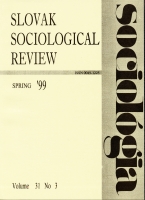Postkomunistická transformácia a nová elita na Slovensku
Post-Communist Transformation and the New Elite in Slovakia
Author(s): Valentína Harmadyová, Ákos Róna-Tas, Ján BunčákSubject(s): Social Sciences
Published by: SAV - Slovenská akadémia vied - Sociologický ústav
Keywords: Post-communist; new elites; transformation; Slovakia; power conversion; technocratic advance; embourgeoisement
Summary/Abstract: Post-Communist Transformation and the New Elite in Slovakia. For the new elite, we mapped in the years 1997-1998 the current national offices and interviewed sample of those offices holders. To find the new economic elite, we obtained a list of the largest 2000 companies, measured by total sales, and interviewed the chief executive officer. For our old economic elite we took a random sample of the old nomenclatura by identifying the people in the country who held nomenclatura positions in 1988. The two economic elites are comparable, since the economic nomenklatura included primarily manager of large companies. For comparison, we used an elite survey conducted in the Czech Republic in 1993. Analysis and comparisons of our data give opportunity to answer some basic theoretical hypotheses about emerging of new elite in Slovakia: - Demographic composition. (In the economic elite women gained some ground. The new economic elite is significantly youngest than political and cultural elite.) - Circulation vs. Reproduction. (Most of the newcomers to the new economic elite came from the group of professionals. They are relatively few people in the new economic elite, who was part of the political leadership in 1988.) - Power conversion. (The Czech and Slovak difference reflects an important divergence between the two countries. In the Czech Republic, members of the last Communist nomenclature were squeezed out of political life. In Slovakia, the Meciar government has never been that hostile to ex-Communists.) - Technocratic advance. (The new economic elite is more likely to have degrees in the natural and social sciences and humanities, but these are less common degrees overall than engineering, law and business.) - Interrupted embourgeoisement. (The new economic elite comes from the best educated pre-Communist families followed by the new cultural elite and then the new political elite. Despite years of discrimination against large and small capitalists, efforts to eliminate pre-Communist educational privileges and to suppress national differences within Slovakia, these distinctions survived and now resurface after more than four decades.) Sociológia 1999, Vol. 31 (No. 3: 235-262)
Journal: Sociológia - Slovak Sociological Review
- Issue Year: 1999
- Issue No: 3
- Page Range: 235-262
- Page Count: 28
- Language: English

